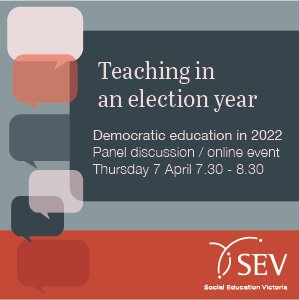These are the rough notes I made for a panel session run by Social Education Victoria about Teaching in an Election Year. As is always the case, the students were the best part of the presentation.

I’m going to say something that I think might prove to be a little bit provocative. While I think a provocative statement is always a good place to start for a panel, I’m not saying this solely to be provocative. Instead, I actually think this is a crucial consideration for teachers – at all times, but especially during the heightened tensions of an electoral campaign.
It’s time to shed the false cloak of objectivity.
I work in initial teacher education, and often ask pre-service teachers: how can we be responsible and professional when teaching about contentious issues. The answer that the teachers provide is often something along the lines of ‘just the facts, ma’am’. In other words, I, as a teacher, will be a paragon of neutrality and objectivity. I will be a cipher, an unknowable font of wisdom about the mechanics of government. This comes up in other areas, too, not just in CCCE.
Students say they’ll stick to what’s in the curriculum – which ignores their role and agency in interpreting a document written for adults and making it meaningful for children.
This frustrates me intensely. It’s a falsehood to think that we, as teachers, work in a value free environment. For better or worse, school, community and personal values are being presented from the moment students enter in the morning. It’s even a myth to say that our curriculum is objective – it is a document laden with value statements – ask any History teacher about the arguments between invasion and settlement to see what I mean. And, of course, it’s a myth to think that our own values and priorities don’t shape the work that we do as teachers. Nothing about education is fair or neutral – and, increasingly, very little is fair, too.
So instead of this false objectivity, I instead encourage us to adopt a position of radical transparency. This sounds scary – but I want to be clear – I’m not advocating for indoctrination. No, far from it. Let me explain.
Civics and citizenship isn’t about the facts. Well, not just the facts. If we focus solely on the mechanics of government, or the history of democracy in Australia, we miss out on all the good bits, and we will rapidly leave behind out students – I mean, very few of them are that interested in referendum debates!
Instead, we as teachers can model a form of active citizenship in our own honesty and practice. If we acknowledge the idea that democracy and civil society is about a contestation of ideas, about civil disagreement while respecting the rights of all individuals – and I hope we do – then it’s incumbent upon us to model that in our classrooms. Of course the way we model it, and with whom, will be context-dependent, but all of it is based upon the fact that we, as teachers, have opinions and beliefs. We should be honest about these, and equally honest about encouraging visitors, other teachers and perhaps most importantly, students to challenge those beliefs. This is the very foundation of democracy.
Central to that is how we navigate disagreement, and how we seek to build consensus and encourage compromise.
So, the old saying about democracy is like a sausage being made – no one what’s to see the process – it doesn’t apply in school. In fact, in some ways, we as teachers need to model the work of the sausage maker for our students!
